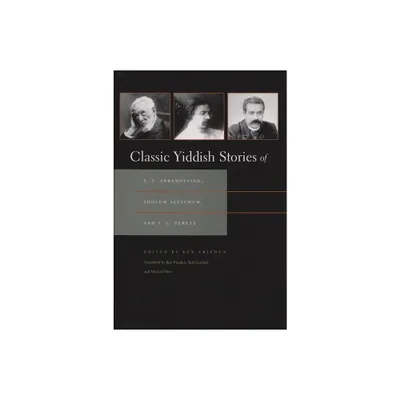Home
Classic Yiddish Stories of S. Y. Abramovitsh, Sholem Aleichem, and I. L. Peretz
Loading Inventory...
Barnes and Noble
Classic Yiddish Stories of S. Y. Abramovitsh, Sholem Aleichem, and I. L. Peretz
Current price: $16.95


Barnes and Noble
Classic Yiddish Stories of S. Y. Abramovitsh, Sholem Aleichem, and I. L. Peretz
Current price: $16.95
Loading Inventory...
Size: OS
*Product Information may vary - to confirm product availability, pricing, and additional information please contact Barnes and Noble
Two novellas by S. Y. Abramovitsh open this collection of the best short works by three influential nineteenth-century Jewish authors. Abra- movitsh's alter ego--Mendele the Book Peddler--introduces himself and narrates both The Little Man and Fishke the Lame. His cast of characters includes Isaac Abraham as tailor's apprentice, choirboy, and corrupt businessman; Mendele's friend Wine 'n' Candles Alter; and Fishke, who travels through the Ukraine with a caravan of beggars.
Sholem Aleichem's lively stories reintroduce us to Tevye, the gregarious dairyman, as he describes the pleasures of raising his independent-minded daughters. These are followed by short monologues in which Aleichem gives voice to unforgettable characters from Eastern Europe to the Lower East Side. Finally, I. L. Peretz's neo-hasidic tales draw on hasidic traditions in the service of modern literature. These stories provide an unsentimental look back at Jewish life in Eastern Europe. Although nostalgia occasionally colors their prose, the writers were social critics who understood the shortcomings of shtetl life. For the general reader, these translations breathe new life into the extraordinary worlds of Yiddish literature. The introduction, glossary, and biographical essays contemporaneous to each author put those worlds into context, making the book indispensable to students and scholars of Yiddish culture.
Sholem Aleichem's lively stories reintroduce us to Tevye, the gregarious dairyman, as he describes the pleasures of raising his independent-minded daughters. These are followed by short monologues in which Aleichem gives voice to unforgettable characters from Eastern Europe to the Lower East Side. Finally, I. L. Peretz's neo-hasidic tales draw on hasidic traditions in the service of modern literature. These stories provide an unsentimental look back at Jewish life in Eastern Europe. Although nostalgia occasionally colors their prose, the writers were social critics who understood the shortcomings of shtetl life. For the general reader, these translations breathe new life into the extraordinary worlds of Yiddish literature. The introduction, glossary, and biographical essays contemporaneous to each author put those worlds into context, making the book indispensable to students and scholars of Yiddish culture.


















